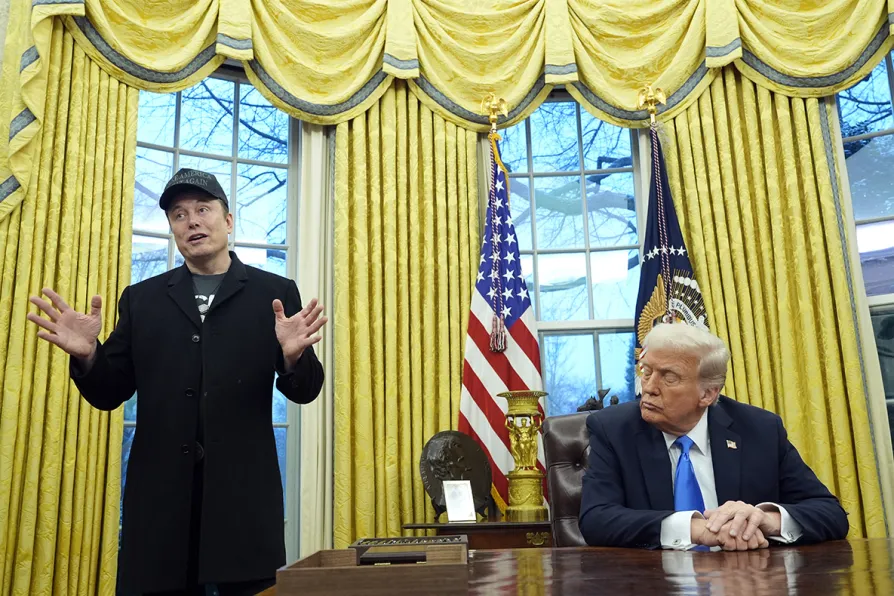CHRISTOPHE DOMEC speaks to CHRIS SMALLS, who helped set up the Amazon Labor Union, on how weak leadership debilitates union activism and dilutes their purpose
As Trump targets universities while Homeland Security chief Kristi Noem redefines habeas corpus as presidential deportation power, STEPHEN ARNELL traces how John Scopes’s optimism about academic freedom’s triumph now seems tragically premature

 US President Donald Trump listens as Elon Musk speaks in the Oval Office at the White House, February 11, 2025, in Washington
US President Donald Trump listens as Elon Musk speaks in the Oval Office at the White House, February 11, 2025, in Washington
AS THE Trump administration attempts to intimidate Harvard and crack down on education and non-Musk-related intellectual exploration in general, it’s difficult not to be reminded of the infamous Scopes “monkey trial,” conducted a century ago this July.
Briefly, Tennessee high school teacher John T Scopes was accused of violating the Butler Act, a state law outlawing the teaching of human evolution in public schools. Scopes was represented by the American Civil Liberties Union, which had offered to defend anyone accused of violating the Butler Act in order to challenge the law’s constitutionality.
At the trial principal defence attorney Clarence Darrow argued: “If today you can take a thing like evolution and make it a crime to teach it in the public school, tomorrow you can make it a crime to teach it in the private schools, and the next year you can make it a crime to teach it to the hustings or in the church.
“At the next session you may ban books and newspapers. Soon you may set Catholic against Protestant and Protestant against Protestant and try to foist your own religion upon the minds of men.”
Despite this sterling rebuttal by Darrow, a noted civil libertarian (defence attorney in the Ossian Sweet/Leopold and Loew trials), Scopes was found guilty and was fined $100 (now equivalent to $1,800).
Two years later, the verdict was overturned on a technicality, but the Butler Act remained on the Tennessee statute books until it was repealed in 1967, when Donald Trump was 21, a year after Beatles records were burned in the South due to John Lennon’s remark that the group was, “more popular than Jesus.”
Trump now appears to be barrelling full-tilt to install a regime actively biased against science and intellectual freedom, where academic visitors to the US are routinely checked for perceived anti-Maga writings/tweets.
Of course, in Britain, we can’t claim to be immune to the wave of government-driven anti-intellectualism in the US.
Remember Michael Gove and other Brexiteers’ regular tirades against experts? Liz Truss’s knuckle-dragging conspiracy theories, and of course Boris Johnson’s (“Fanatically anti-intellectual,” according to his former Islington neighbour David Goodhart) thick-headed pronouncements, cloaked by his Etonian demeanour and trademark random Latin quotes?
Not to mention the troglodytic antics of Reform’s Lee Anderson and pals, who, for older readers, appear to model themselves on comedian Dick Emery’s gormless “Bovver Boy” character (fun fact: Harold Pinter contributed to Emery’s TV show).
After his victory Scopes said: “I believe that the Dayton trial marked the beginning of the decline of fundamentalism … I feel that restrictive legislation on academic freedom is forever a thing of the past, that religion and science may now address one another in an atmosphere of mutual respect and of a common quest for truth. I like to think that the Dayton trial had some part in bringing to birth this new era.”
His words now appear sadly premature, at least in the Maga US, where Homeland Security Secretary Kristi Noem recently defined habeas corpus as “a constitutional right that the president has to be able to remove people from this country.”
In what used to be regarded as reality, habeas corpus is the constitutional legal principle which safeguards individuals from illegal confinement by enabling them to petition the court to review the legality of their detention. Still, when her boss decries “white genocide” in South Africa and touts Gaza as a potential beach resort, what can you expect?

The Trump government is seizing overseas students from their homes and campuses and even off the streets, with no legal grounds and no due process, writes LINDA PENTZ GUNTER












